- Home
- Joel C. Rosenberg
The Twelfth Imam Page 7
The Twelfth Imam Read online
Page 7
It had been a long day, and once the gear had been set up or stowed for later, the whole group was sleeping by 9 p.m. The next four days stretched out in front of them with the promise of endless pike and walleye. But the fish would wait till morning.
14
Sadr City, Iraq
Najjar Malik was exhausted.
Even after a long nap and a simple, home-cooked meal, the morning’s violence, the malfunctioning machine gun, and the strange encounter with the mysterious taxi driver still rattled him.
After dinner, in spite of his weary protests, Najjar’s aunt and uncle took him shopping in the bazaar. At one point, his aunt was haggling with a grocer over the quality of some pistachios while his uncle sat across the street in the shade, smoking a water pipe and chatting with the older men. Najjar looked over a collection of leather boots and wished he had enough to buy himself a pair. But he still hadn’t found his wallet, and when it was clear he wasn’t going to be buying anything that day, the shoe seller told him to go away.
Najjar nervously inched his way through the market, still wondering who the man was who had been kidnapped, still wondering who had kidnapped him and why, and why they had killed his wife and child. The gruesome images were indelibly etched in his mind’s eye. He wanted to forget it all, but he could not. Was it political? Was it for money? He didn’t want to think about any of it, but he couldn’t think of anything else.
Just then he nearly tripped over a beggar sitting cross-legged against a cement wall.
“Forgive me,” Najjar said. “I didn’t see you there.”
“It is not mine to forgive,” said the beggar, a surprisingly young man—hardly older than Najjar himself—covered in a dirty brown robe and wearing no sandals or shoes. His filthy black feet were covered with oozing blisters. “Only Allah can do that, if he so chooses.”
Najjar shrugged. The religious fervor of his youth was dying. What had Allah really given him? Sadness. Loneliness. Poverty. Despair. Were these the gifts Allah gave to his children?
“Come, my friend,” the beggar said, “you look downtrodden. Let me tell you about your future.”
Najjar shook his head, then scanned the crowd to find his aunt and uncle.
“You don’t want to know your future?” the beggar asked. “Or you don’t think I can see it?”
“Both,” Najjar half lied. He desperately wanted to know his future. But he hadn’t time for back-alley charlatans.
“I think you are lying,” the beggar said, his tone suddenly low and sober. “I think you desperately want to know your future. But you think you haven’t time to spare for some back-alley charlatan.”
Startled, Najjar whipped his head around and stared at the young homeless man in disbelief.
“You are troubled by the violence you saw in the street this morning,” the beggar said, his face smudged with dirt. “But all your questions will be answered in due course.”
Najjar was scared. Who is this person? How can he know my most intimate thoughts?
“May I ask you a question?” the beggar said.
Najjar nodded.
“If you could go anywhere in the world, if you could travel anywhere and money was no object, where would you go?”
“I don’t know,” Najjar said blankly.
“Again you are lying,” the beggar said. “You don’t trust me. Fair enough. You don’t know me. But the moment I asked you, you instantly thought of where you would like to go, true?”
Najjar was embarrassed and confused. He nodded again.
“Write it down,” the beggar said.
“Where?”
“On a piece of paper. Don’t let me see it. But I will tell you what you write.”
“That’s impossible.”
“Nothing is impossible.”
Najjar didn’t have a piece of paper on him, much less a pen or pencil, but he turned back to the hustle and bustle of the bazaar and found a grocer nearby. From him, he secured a small pencil, then spotted an empty cigarette pack on the ground. Najjar ripped open the pack and scribbled down a location inside, carefully shielding it from the beggar and any other prying eyes that might be around. When he was finished, he stuffed the pack in his jeans pocket and stared back at the young man who now captivated his attention.
“Bless you,” the beggar said.
“Why do you say that?” Najjar asked.
“Because you just wrote down the Jamkaran Mosque near Qom, Iran.”
Najjar’s eyes went wide. “How did you do that?” he asked, his pulse pounding. “How did you know?”
The beggar didn’t respond. His face revealed no expression whatsoever. Instead, he simply said, “Now write down the name of a world leader.”
Unnerved, Najjar hesitated. “Living or dead?” he asked.
“You choose,” the beggar said.
Najjar pulled out the cigarette pack, scratched out Jamkaran Mosque, and wrote, Saddam Hussein. Then, realizing that would be too obvious, he thought for a few moments, crossed out Saddam, and wrote instead, Fulgencio Batista. Batista, Najjar had recently learned, had been the president of Cuba in the late 1950s. He crumpled up the cigarette pack and put it back into his pocket.
“You have chosen well, my friend,” the beggar said.
“How so?”
“I am touched.”
“Why?”
“For you are truly a spiritual young man. Allah can do great things with one such as you.”
Najjar had no idea what the man meant, but it was obvious he didn’t know what Najjar had written down. Then Najjar heard his aunt calling for him.
“I have to go.”
“But I have not given you the answer,” the beggar said.
“I don’t think you know.”
“But I do.”
“Then whose name did I write down?”
“Muhammad Ibn Hasan Ibn Ali,” the beggar said.
“Ha!” Najjar said, somewhat disappointed but determined not to be perceived as nearly having fallen for this man’s trickery. “Not even close. You think that just because I’ve always wanted to visit the wishing well in Iran where the Twelfth Imam once appeared that I would actually be so stupid as to write down the name of the Mahdi, peace be upon him?”
“Actually,” the beggar said, “first you wrote down Saddam Hussein’s name. Only then did you choose the Promised One.”
Najjar again was stunned. The man was half right. But this, too, was strange. How could the beggar know that Najjar had written down Saddam’s name at first but not know that he had replaced it with Batista’s name? None of it made sense.
Uneasy, Najjar decided it was time to go. His aunt was calling him again and sounded quite annoyed. He pulled the cigarette packet from his pocket and tossed it to the beggar.
“See for yourself,” he said, then turned to his aunt and yelled, “I’m coming!”
The beggar caught the rumpled pack but did not open it. Rather, he tossed it right back at Najjar, seeming to dare Najjar to reconsider. A bit annoyed himself now, Najjar walked over to the beggar, leaned down, opened the cigarette pack, and prepared to read the name Fulgencio Batista.
But to his shock, the words were not there.
Rather, next to the scratched-out name of Saddam Hussein was the name Muhammad Ibn Hasan Ibn Ali—in his own handwriting, no less.
Dumbfounded, Najjar looked back at the beggar. He tried to say something, but no words formed.
The young beggar spoke instead. “You will serve the Promised One when the time is right. You are not yet ready. But do not fear. The time has not yet come.”
Najjar suddenly felt icy cold. His fingers went numb. Now his uncle was demanding he come home with them. He looked up to ask his uncle for another few minutes. He had questions. He needed answers. But when he looked back, the beggar was gone.
15
Gouin Reservoir, Quebec, Canada
For David, it was even better than the stories he’d been told.
His older
brothers had told him about their adventures, but they weren’t capable of describing the color of the sky in the dawn or the feeling of being so far removed from any other human beings. David felt like a pioneer and imagined that their group was as far as human society had ever gone. He spent the first full day glued to his dad’s side, getting an introduction to the walleye up close and by the dozen. He’d never seen a place so thick with fish, as if no one had ever fished here except the black bears. He and his father skimmed around the edges of the island in low, flat, jigging boats, and David began to learn how to work the sonar and how to feel a strike as he held the rod. The fish were low and deep in the lake, but they hauled them up and into their boat all day, stopping only to drift in a little bay as they munched PB&J and the last of the doughnuts the boys had bought at the airport in Montreal. The water was clear, the sky was deep blue, and even the simplest of sandwiches tasted wonderful. Of course, there would be plenty of fish for dinner.
David wondered how Marseille and Mr. Harper were getting on. The two had decided to spend the morning on a hike with the promise to rejoin the fishermen in midafternoon. David found himself looking forward to seeing her and even tried to prethink some better conversation than he’d been able to summon up thus far. He wondered if she even liked fishing, seeing as she and her dad were the only ones who hadn’t plunged in first thing. Either way, though he was a bit embarrassed to think it, he was actually glad she was here. Maybe his father hadn’t done such a bad thing after all.
David wasn’t disappointed, therefore, to see Marseille sitting by the shore when his father’s boat came to rest at the dock. As the two dads took the opportunity to grab a cold drink together and catch up on old times, David shyly asked Marseille if she was up for a walk. “Want to show me what you guys discovered all morning?” He hoped he didn’t sound too eager.
Smiling, she said, “Sure. We just walked along the shore for a long time and tried to see if we could make it around the whole circumference of the island. We weren’t even close. This place is huge!”
David grabbed a thermos of water, and the two wandered off together. After a few minutes, he realized they were heading straight for their “ghost town.”
Marseille pointed out the clawed screens of the cabins, and David decided it might be better not to make any more bear jokes. The A-frame seemed almost tidy among the group of shabby cabins, and with both of them exerting their full weight at the same moment, they were able to force open the front door. Inside they found a few sling-back chairs and a very basic bed frame supporting an ancient, thin mattress. David used his sweatshirt to dust off the chairs and dragged them over to the open doorway. They both plopped into them, feeling quite at home.
“Any good fish stories from your morning on the reservoir?” Marseille asked.
He liked the question, liked the way she asked it, liked the way she looked at him with real interest.
“It was great to be out with my dad. I’m a walleye rookie, but I caught more than I thought I would.”
David asked about her school and found out her favorite classes were English, creative writing, history, and drama. He asked about her hobbies and learned she played the piano, only because her mother wanted her to, but also the saxophone because she loved it. She ran cross-country but not terribly well; she loved poetry, Shakespeare, singing in the choir, and especially acting in school plays. She was looking forward to the spring, when she planned to try out for the part of Nellie Forbush in the production of South Pacific at her school. Her real dream was someday to play the role of Cosette in Les Mis on Broadway, or better yet, in London or Paris.
“What about politics?” he asked her.
“What about it?”
“Are you a Democrat or a Republican?”
“I have no idea,” she said.
“No idea?” he asked, incredulous.
“No, why should I?”
“Weren’t your parents Foreign Service officers in France, Italy, and Switzerland after getting out of Iran?”
“Yeah, so?”
“So doesn’t your father teach history and U.S. foreign policy at Princeton?”
“Yeah, so?”
“So wasn’t your mom a consultant for the Treasury Department for a few years before getting a job with some big investment bank in Manhattan?”
“She was, but how do you know all that?” Marseille asked.
David shrugged. “I don’t know—I hear things; I remember them. The point is, your parents are so interested in the world and in government. Didn’t any of that rub off on you?”
“I guess not,” Marseille said. “I can’t stand politics. It’s just a bunch of old men arguing and spending all of our money.”
David laughed. She was feisty and sure of herself, and he liked that. “Do you think it’s all going to get better if young people like us tune out the world’s problems and do nothing?”
“No,” she conceded.
“Well, shouldn’t you pick a team and root for it?”
“Maybe,” she said at last, pulling a box of Junior Mints from her knapsack and eating a few without offering him any. “All right, which party should I sign up for—Republicans or Democrats?”
David laughed again. “Well, it’s really not for me to say,” he said, sure she was going to prove to be a liberal Democrat like him but wanting her to come to her own conclusion lest he look too pushy. “How about this? I’ll give you a little test to see if you’re a liberal or a conservative. Then you decide which party is best for you. Deal?”
Marseille thought about that for a moment and liked it. “Deal.”
“Okay, let’s see. Are taxes too low or too high?”
“Too high.”
“Should government spend more or less on education, health care, the environment, and other important necessities?”
“Government spends too much as it is,” she said. “I think they should let people keep more of what they earn.”
David continued cautiously, surprised by her answers. “Should the government protect a woman’s right to choose?”
“You mean abortion? No way! It’s a baby, David. You can’t kill a baby in her mother’s womb.”
David gulped.
“Don’t you agree?” she pressed.
“Well . . .”
“Isn’t government supposed to protect life, liberty, and the pursuit of happiness?” she continued. “Life—it’s the first one, for crying out loud. Life comes first, then choice. If you switch that around, you’ve got chaos. Right?”
David was stumped and decided to move on. “What about gay rights?” he asked.
“Well, you shouldn’t be mean to gay people, but they shouldn’t have special rights. After all, marriage is a beautiful, sacred thing, between one man and one woman, don’t you think?”
David nodded weakly.
“Don’t you think?” she pressed a bit stronger, popping a few more Junior Mints into her mouth and smiling.
“Absolutely,” he insisted. “Beautiful, sacred—absolutely.”
He asked her some foreign policy questions, then a few about trade policy and immigration. When he was done, he just sat there for a few minutes, trying to process all that he’d just heard.
“Well?” she asked, practically glowing in the fiery rays of the sun beaming through the window. “What am I?”
David shook his head. “You’re a 99.967-percent rock-solid conservative.”
“Really?” she said, seeming happy with the sound of that. “So that’s the Republicans, right?”
David nodded but was crestfallen. He liked this girl. But he couldn’t fall for a Republican, could he?
“So are you a Republican too, David?”
At that, he shook his head, almost imperceptibly.
Marseille was aghast. “What do you mean? Don’t you agree with me on all those things?”
They talked and argued—civilly, but passionately—as the afternoon slipped away unnoticed. For someone not intereste
d in politics, she certainly had strong opinions! Before they realized it, the sun had fully set, and they were arguing by the light of their flashlights. David suggested they’d better put their political feud on hold and get back before their fathers sent out a search party for them. Reluctantly, Marseille agreed.
“Maybe we should change the subject,” David said as they bushwhacked their way to the camp.
“Maybe.” They picked their way around a fallen tree in the darkness. “So what about you? What do you dream of doing someday, aside from running for president as a lunatic Democrat?”
“Very funny,” David said. He stopped walking for a moment. “You really want to know what my dream is?”
She nodded, expectantly.
“I dream—” he hesitated, and her eyes widened—“of having some of those Junior Mints.”
Marseille laughed. “Dream on. These are my own special treat.”
“You’re really not going to offer me one?” he said. “Not even one?”
“Maybe if you really tell me your dream.”
He smiled. “All right, it’s a deal.”
“Go ahead,” Marseille said. “I’m listening.”
“Actually, I’ve never told anyone this. . . .”
“It’s okay,” she said. “You can tell me.”
He took a deep breath.
“My dream . . .”
She leaned in. “Is . . . ?”
He paused again, letting the suspense build further. “. . . to get back to camp without being eaten by a bear.”
With that, he took off in a sprint for their camp, laughing, with Marseille running after him, yelling and trying to catch up.
16
Sadr City, Iraq
Najjar lay in bed and closed his eyes, but he could not sleep.
His mind raced as he pored over every detail of the kidnapping and his encounters with the taxi driver and later with the beggar. Then he thought of the little boy who had rescued him from a beating by those bullies when he was just ten years old. Was Allah calling him? Najjar wondered. Had he sent angels to protect him, to speak to him? Was he truly being chosen to know and serve the Promised One? It couldn’t possibly be. He had no parents, no money, no religious clerics in his family, no political power, no influential friends, no reason of any kind to attract the attention of the Mahdi, peace be upon him. Yet how could he deny this bizarre chain of events?

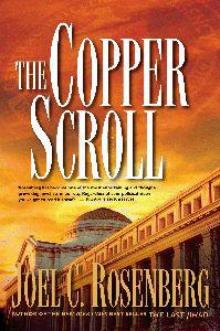 The Copper Scroll
The Copper Scroll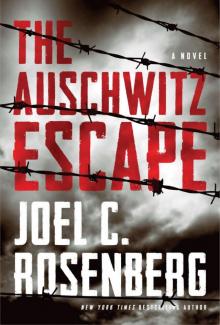 The Auschwitz Escape
The Auschwitz Escape The Last Jihad
The Last Jihad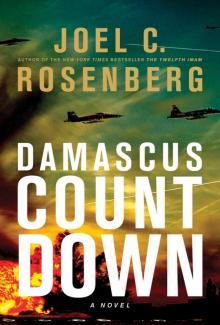 Damascus Countdown
Damascus Countdown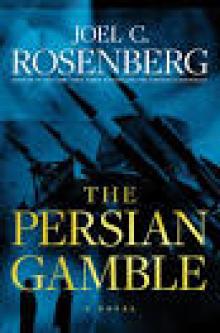 The Persian Gamble
The Persian Gamble The Jerusalem Assassin
The Jerusalem Assassin Dead Heat
Dead Heat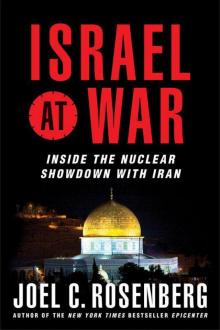 Israel at War: Inside the Nuclear Showdown With Iran
Israel at War: Inside the Nuclear Showdown With Iran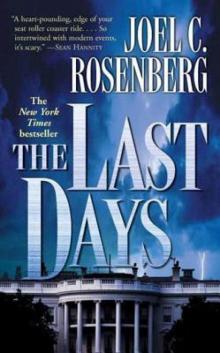 The Last Days
The Last Days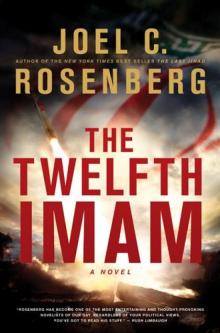 The Twelfth Imam
The Twelfth Imam Epicenter 2.0
Epicenter 2.0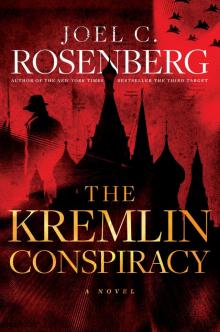 The Kremlin Conspiracy
The Kremlin Conspiracy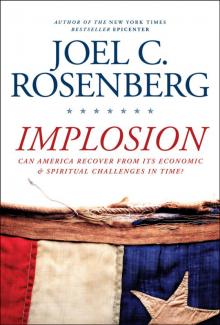 Implosion: Can America Recover From Its Economic and Spiritual Challenges in Time?
Implosion: Can America Recover From Its Economic and Spiritual Challenges in Time?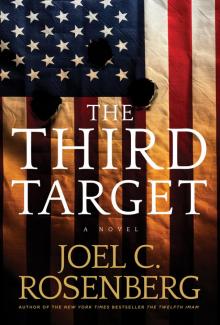 The Third Target: A J. B. Collins Novel
The Third Target: A J. B. Collins Novel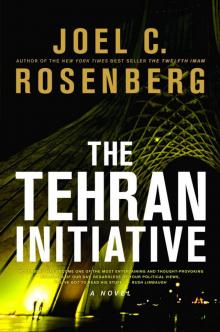 The Tehran Initiative
The Tehran Initiative Inside the Revolution
Inside the Revolution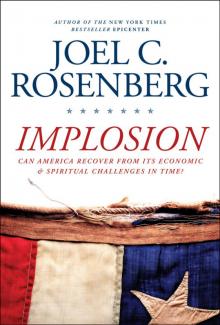 Implosion
Implosion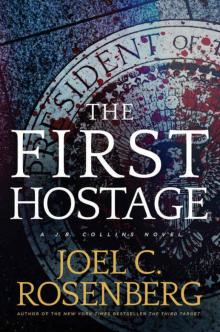 The First Hostage: A J. B. Collins Novel
The First Hostage: A J. B. Collins Novel